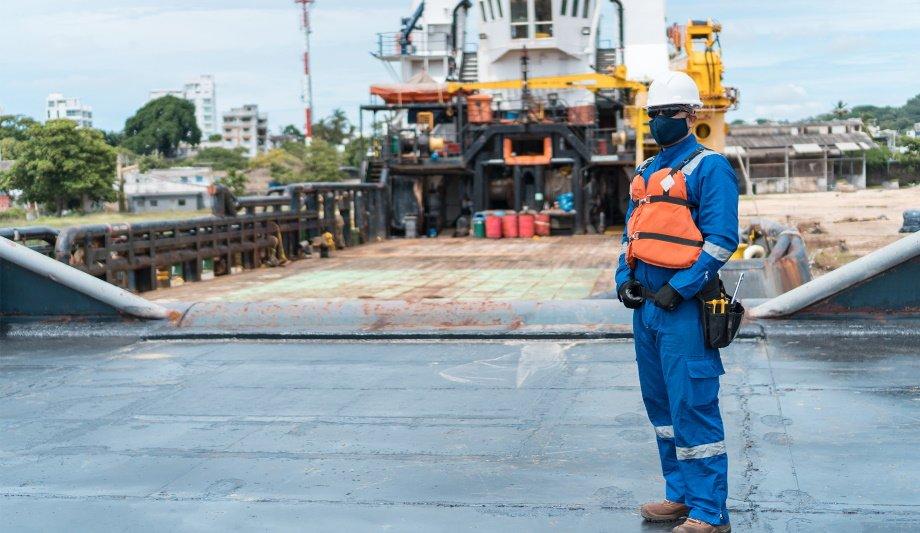Health and safety are key considerations for all maritime organisations, in particular, for those operating in remote locations or where extreme weather conditions may put workforces at greater risk. With COVID-19 here to stay for the foreseeable future, it is vital that shipping organisations consider both the short and long term safeguarding measures, which are required to protect their workers at sea.
COVID-19 management plans
Establishing safe working conditions and providing onboard expert medical care has always been of paramount importance but, now, effective COVID-19 management plans have also become essential in creating safe working environments and, importantly, in keeping them operational when personnel contract COVID-19.
In these circumstances, controlling the spread of infection remains mission critical and for companies, like RMI
In these circumstances, controlling the spread of infection remains mission critical and for companies, like Remote Medical International (RMI), which provides health and medical support to teams, operating in remote or hard to reach locations, the need for COVID testing services has resulted in rapid scale up and business diversification.
Early on during the COVID-19 pandemic, the world learned that many symptoms presented by an individual had the potential to be a positive case. This knowledge was used to respond to clients’ needs, in order to get employees back to work safely, as quickly as possible.
COVID pre-mobilisation testing
The sharp rise in demand for testing has resulted in an upscale of COVID pre-mobilisation testing at ports and harbours, for teams heading offshore, on-site COVID-19 audits, and virtual consultancy for remote teams. This shift in demand means that over 25% of the business is now COVID-19 related.
Over two years, RMI’s medical experts have helped various shipping organisations on screening programmes that are tailored to their current needs. Their global presence and team of over 200 highly qualified medics, means they are well set to provide assistance services 24/7, with telemedicine support, case management and security services, adding to a one-stop-shop for all global medical and risk management requirements.
One of the key concerns of shipping organisations has been how to manage a potential outbreak of COVID-19 offshore, and RMI has seen a variety of new demands imposed on personnel, who await embarkment at UK ports, for activities in the North Sea. In 2020, RMI began to work closely with a leading independent oil and gas company, to mitigate the spread of COVID-19 offshore.
Ad-hoc testing for personnel embarking and travelling offshore
Initially, RMI issued ad-hoc testing to personnel, who were due to embark and travel offshore
Initially, RMI issued ad-hoc testing to personnel, who were due to embark and travel offshore. Crews were ranked by risk and then tested as a matter of priority: personnel would stay in a local hotel, awaiting the results of their test and if negative, would soon travel offshore.
However, very quickly, the need for ad-hoc testing progressed into the requirement for regular daily testing, not made any easier by the complications of sending thousands of staff offshore weekly during a pandemic.
RMI medics and shipping staff combine
The hotel facilities were, therefore, expanded and in total, over 18,695 personnel were tested. RMI’s medics, already highly trained and qualified, had to adapt quickly to the novel protocols required, when providing a rapid point of care PCR test, delivering 80 to 90 tests a day within an eight-hour window meant that there was no room for error.
In this way, the collaboration of RMI’s medics with shipping staff under increasingly challenging conditions ultimately protected lives and ensured smooth running of shipping operations.
Rise in demand for COVID-19 risk audits
As the COVID-19 pandemic progresses and with undoubtedly more variants to come, there is an increase in demand for COVID-19 risk audits, which can really help shipping companies to ensure their operations, stay on track. For example, RMI conducted a robust risk assessment on the impact of COVID-19 on employees living at sea and working offshore in Equatorial Guinea.
COVID-19 has made it very challenging to find good medical staff for work – the demand has been far higher than the supply at times, during the past year. RMI sets a very high bar and is committed to only employing the very best, as they have a reputation to protect, as well as the lives of the people that their medics are there to support.
This role particularly suits ex-combat medics, who are looking to use their skills in a different setting and in this case, RMI selected and sent out only the very best to Equatorial Guinea. Their experienced medical auditor, who had just returned from working in Afghanistan, was deployed to document the potential risks at the airport, during their 10-day quarantine in-country, and throughout their assignment offshore.
RMI’s audits designed to cover all bases
Remote Medical International’s audits are designed to ensure that all bases are covered
Remote Medical International’s audits are designed to ensure that all bases are covered. For this project, each location was broken down by levels of risk and included recommendations on how to prevent a possible COVID-19 infection. Each assessment included the level of probability for infection, as well as how to best prevent it, such as always wearing a mask, or limiting access to certain communal areas.
Following the audit, our recommendations consisted of overarching actions that would ultimately prioritise the health and safety of the offshore employees. This included the implementation of a COVID-19 surveillance testing program for facility workers at the quarantine site, establishing a more structured COVID-19 testing programme, creating a training programme to support service staff, and the safest ways to provide services to employees onboard.
RMI delivers critical support in vital and diverse ways
It really is the case that no matter how remote the location or vessel, RMI can deliver critical support in vital and diverse ways. One of their recent operations has seen them provide emergency medical advice to US government owned and operated ships and units, located throughout the world, via the company’s topside assistance service, meaning that no crew is ever alone.
The medical providers onboard could contact the Global Coordination Centre, at any time and be connected to a physician for medical advice within mere minutes. This type of remote support is what can enable crucial operations to continue all year round, despite the COVID-19 pandemic and RMI hopes to support many more, as they navigate these turbulent times.




